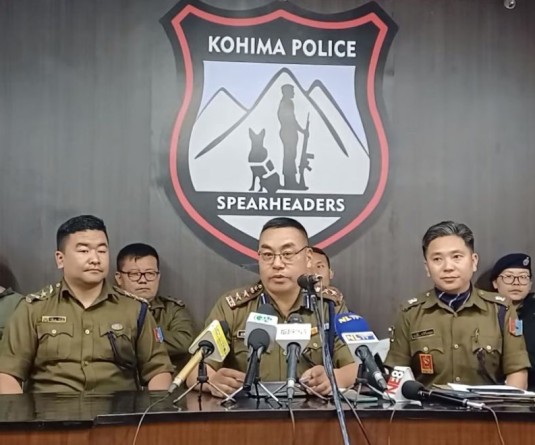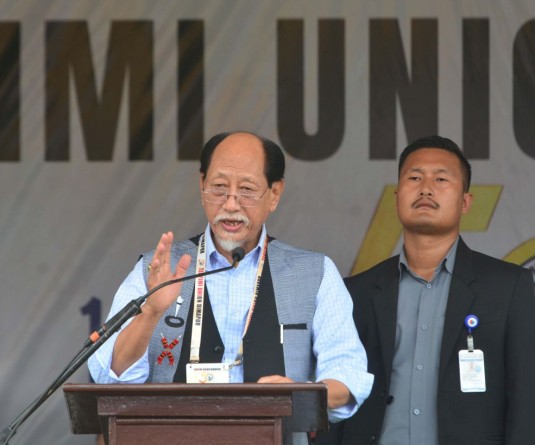
Morung Express News
Dimapur | February 24
A two day national seminar on ‘World Religions: a step towards inter religious dialogue’ organized by the Department of Philosophy, Patkai Christian College (Autonomous) and sponsored by Indian Council of Philosophical Research (ICPR), commenced here at PCC on Friday.
In the first session, a host of resource persons including scholars, intellectuals and leaders of different religious faiths presented their papers.
Executive, SD Jain Samaj Dimapur, Ajay Sethi in his presentation ‘Jainism: a way of life’, said for Jains, the purpose of life is to attain ‘moksa’, or release from the cycle of rebirth and in order to achieve this, a person has to undertake ‘Five great vows’ namely Ahimsa (non-violence), Satya (truth), Achaurya (non-stealing), Brahmachara (celibacy) and Apaigraha (non-acquisition).
Anjan Kr. Borah, DCB Girls College, Jorhat who spoke on ‘Buddhism as the religion of a human world’, said the philosophy and teachings of Lord Buddha has become most relevant in the context of the 21st century. He said the core of Buddha’s teaching of ‘Dharma’ is to abstain from evil, to accumulate what is good and to purify one’s mind. Borah also expounded on the four noble truths of Buddha’s teachings – the truth of suffering, truth of the cause of suffering, truth of the end of suffering, and the truth of the path that leads to the end of suffering.
Prof. RC Pradhan of University of Hyderabad in his discourse on ‘Religious humanism and the new world order’ explored the possibility of humanism within the religious framework and its relevance to the emerging new world order. “It is the demand of the new world order that religions across the globe promote humanism without which the world order may not survive the onslaught of anti-humanist forces. There is a need for re-establishment of human values at the heart of the religious life of the people in general,” he said.
Dr. CP Anto, principal NEISSR, and founder Peace Channel in his paper presentation ‘Peace Channel: a model for inter-religious harmony and universal peace’, said today there is a growing awareness among the followers of different religions living in India that they have to integrate themselves with the reality of pluralism (that no public function or celebration is done without intermingling of religions) and the ideologies of the land if they want to fulfill their obligation and responsibility in building up a new humanity. Anto said Peace Channel draws inspiration from various traditions, civil society practices, religions and philosophies that engender a more peaceful, just and a harmonious society.
Dr. Temjenkala Jamir of Fazl Ali College Mokokchung who dwelled on ‘The assertion of religious studies in the segment of inter-cultural dialogue’, said in a world of diverse cultures and religions, the main aim of inter-cultural dialogue is to create social attitudes which can help the people to understand, appreciate and respect other cultures. She added the dialogue is not just about intellectual understanding of other cultures but to look at the broader perspective by embracing the diversity of culture and by pushing oneself into critical dialogue, which would enhance the boundaries of our humaneness.
Ahidur Rahman, working president Muslim Council Dimapur, in his presentation ‘Islam” a step towards religious dialogue’, said though there might be serious differences among different faiths, which also change with the passage of time’ yet the fundamental concepts of all religions are universal peace and harmony. Stressing on inter religious dialogue to promote cooperation, bondship and remove misconceptions, Rahman also quoted from the Holy Quran, “Invite (all) to the way of the Lord, with wisdom and beautiful preaching and argue with them in ways that are best and most gracious.” (Al-Quaran 16:25) Other resource persons and their topics in the first session were Dr. Vanlaltanpuia of Pachhunga University College, Aizwal (‘Re-interpreting mysticism in dialogue with Eckhart-Heideggerian Hermeneutics” and Dr. Bishnu Charan Das, Assam University (‘Humanity is divinity’).
Prof Xavier P Mao, HoD, Department of Philosophy NEHU and observer from ICPR, New Delhi, chaired the first session. Both Prof Xavier and PCC principal, H Epao addressed the seminar.





